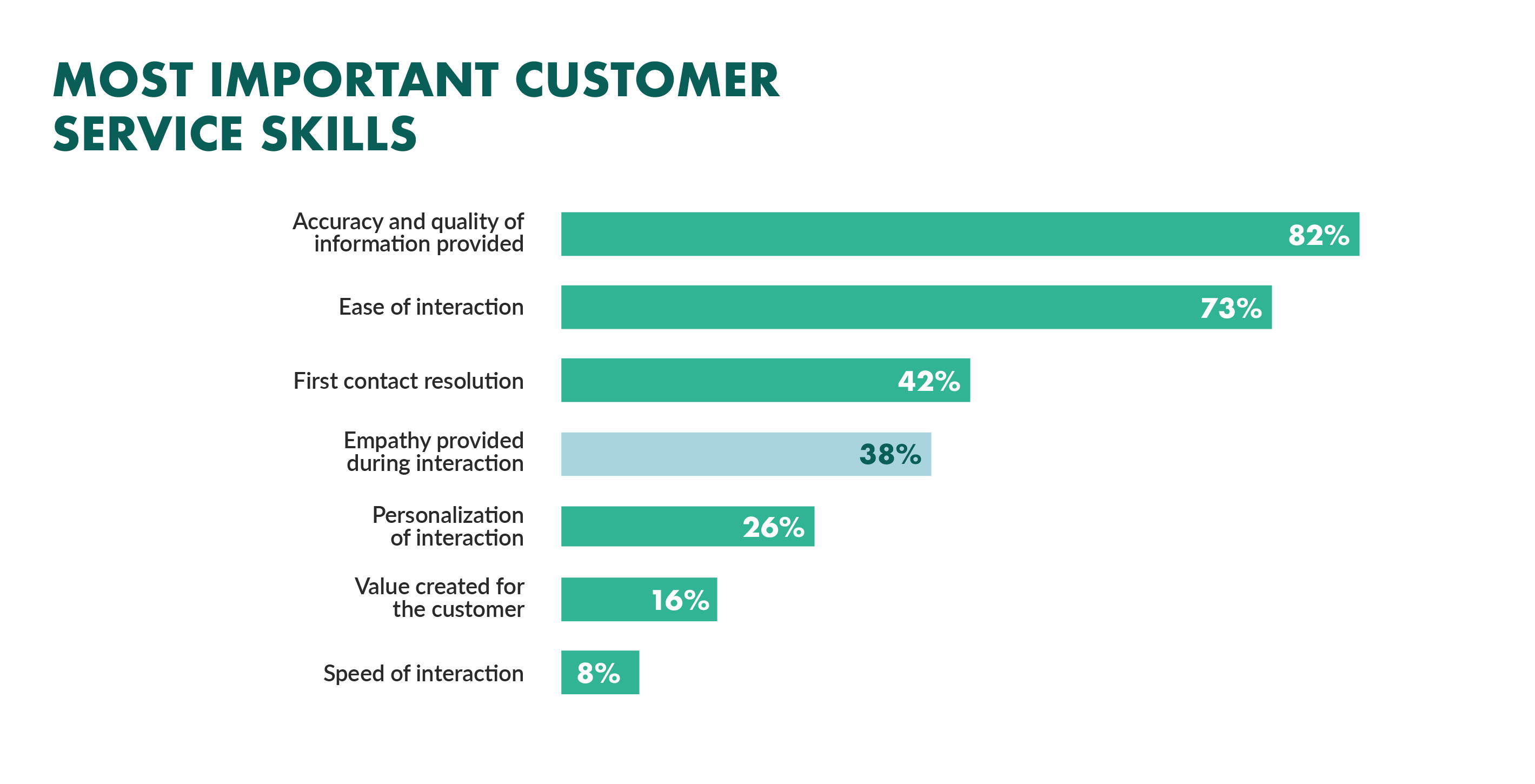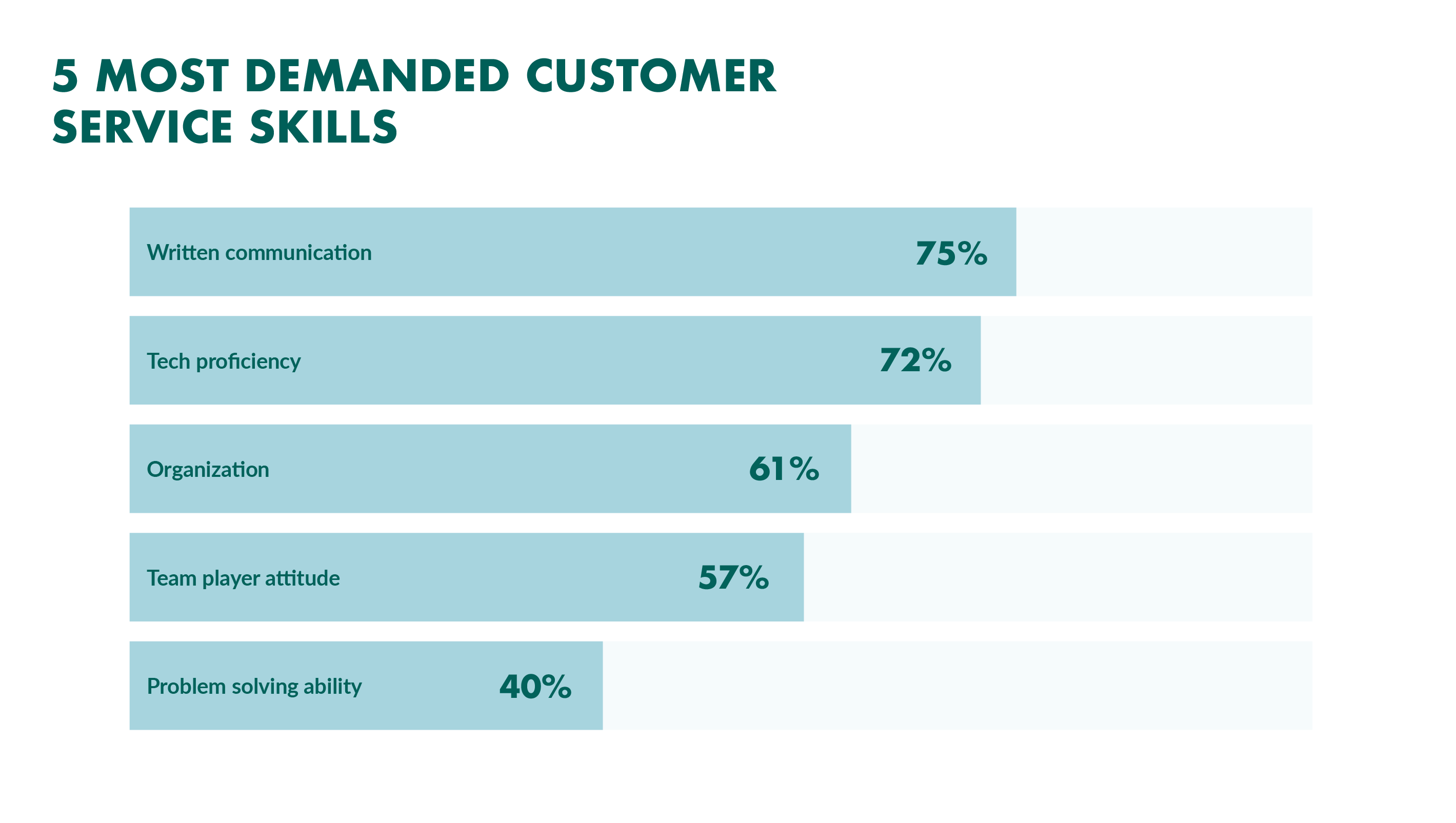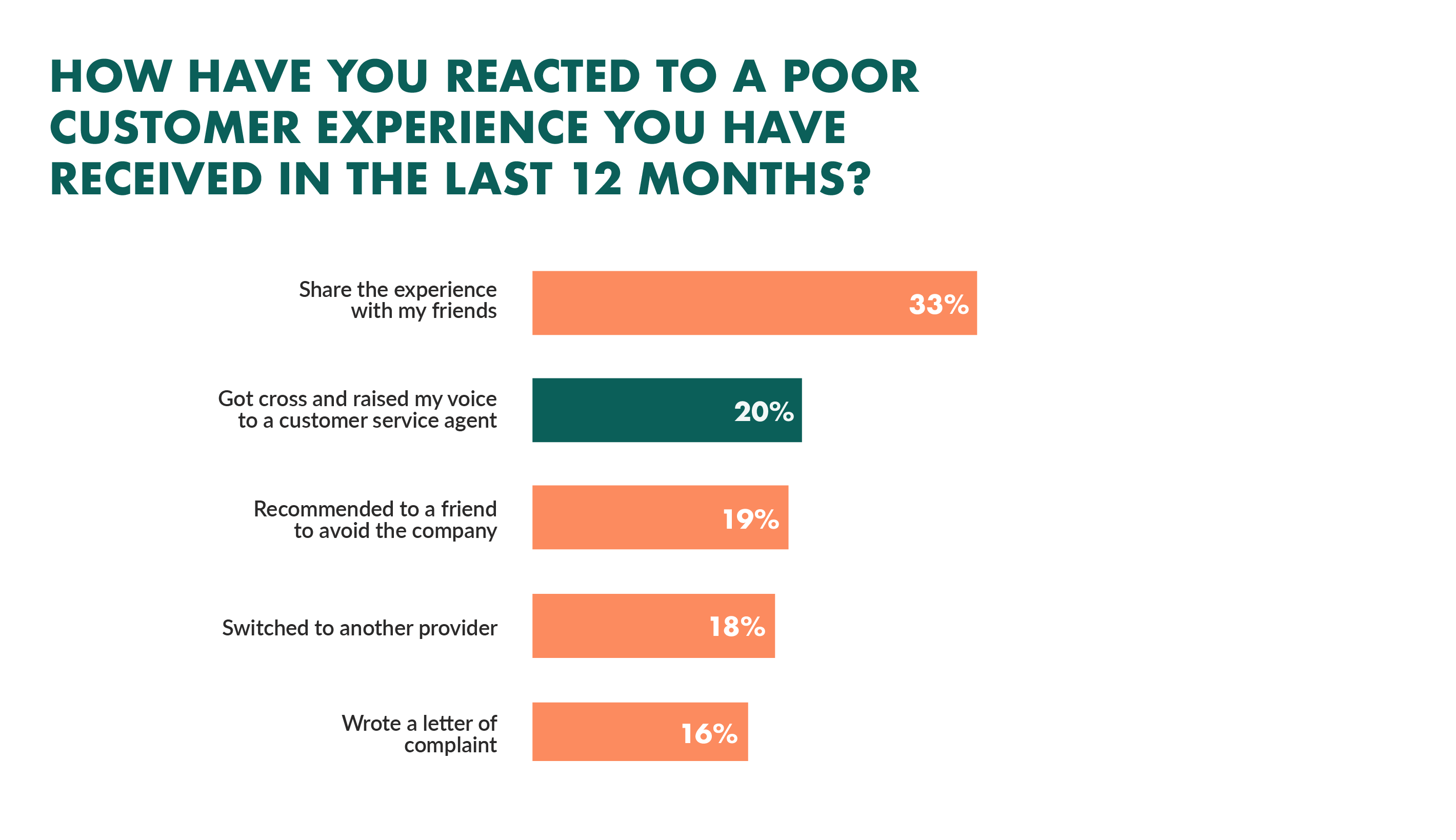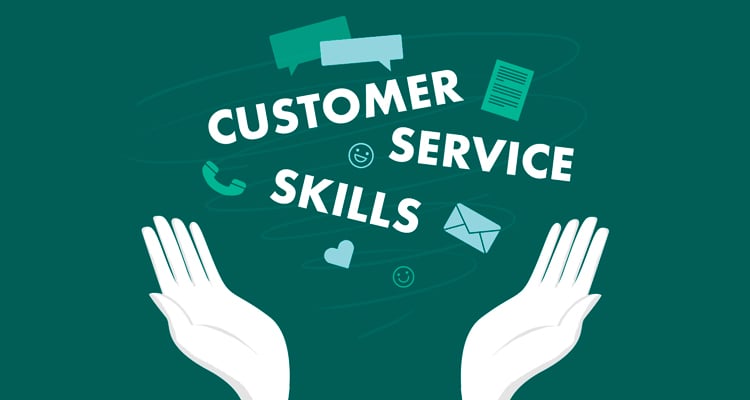Customer service is tough.
Half of all consumers say that they have higher customer service expectations than they did just one year ago.
So, it’s not uncommon for customers to complain and make angry phone calls when a product doesn’t do what they thought it would.
Your customers are not afraid to speak their mind.
This means that customer service reps often find themselves in sticky situations, being on the receiving end of those complaints.
But the right skills will see you through those – without losing your mind in the process.
Here are 12 crucial customer service skills you’ll need to have, with tips on how to build them.
1. Active listening
Ever heard the phrase: “listen more than you speak”?
It’s easy to fill in the silence when you’re on the phone with an unhappy customer. But when you talk too much, you don’t give the customer a chance to articulate what they’re saying. They can feel unheard if they don’t get their point across.
Active listening, however, makes both participants in a conversation feel better. It’s a skill that makes you comfortable with waiting for your customer to lead the conversation (before jumping in with advice.)
Let’s put that into practice and say a customer is calling because they don’t understand how your product works.
The customer isn’t the expert; you are! You’ll need active listening skills to understand exactly what they’re struggling with. They won’t be as good at explaining as you are, because they’re unfamiliar with product terminology.
But by waiting for them to finish their (perhaps chaotic) explanation, you’ll get a more accurate picture of what they’re trying to say. It beats hopping in with wrong advice, or talking at your customer, by a mile.
Feeling unappreciated is the #1 reason why customers ditch a product or service. Active listening shows you’re taking time to understand their problem.
It's no wonder then that the World Economic Forum ranked active listening as one of the most important skills by 2025.
2. Emotional intelligence
Also making the list as a top skill is emotional intelligence.
And like active listening, emotional intelligence is a customer service skill that all agents need.
It’s the ability to focus on the emotions and feelings your customers have, rather than just taking their enquiry literally. You put yourself in their shoes, dealing with the enquiry largely based on the emotions they’re feeling.
We can see emotional intelligence in action when agents give feedback to other lower performing agents.
An agent without any emotional intelligence might deliver the feedback in a way that feels patronizing. However, one with emotional intelligence recognizes that it’s a touchy subject and combines the feedback with something the lower-performing agent does well to make it feel less negative.
It’s why high-performing customer service staff are the #1 scorers for emotional intelligence.
3. Empathy and compassion
Similar to emotional intelligence, showing compassion helps to resolve problems your customers are experiencing when they contact you.
It proves that you’re human, and customers can relate to you based on your response.
In fact, empathy is in such demand that it’s ranked the fourth most important customer service skill (with “speed” barely making the list of tops customer service skill).

Let’s take a look at how empathy is shown. A customer has purchased an item that’s arrived 3 days too late, and they didn’t have it when they needed it. Empathy shows you understand; the customer feels like their frustration is valid. You show empathy by refunding the shipping cost and giving a sincere apology.
Another example is a customer who can't pay their invoice because their company lost its biggest client. You can show compassion by pausing their billing for 1-2 months or extending payment terms by 45 days.
Regardless of how you’re showing empathy to customers, studies show that empathy “provides an emotional bridge that promotes prosocial behavior.”
And it should come as no surprise that one of the biggest brands in the world, Apple, mentions empathy in their staff handbook!
4. Curiosity
Curiosity isn’t a traditional skill that employers look for in their customer service employees.
But similar to problem-solving skills, being genuinely interested in something, by asking questions to dig deeper, makes you a better customer service agent. You’ll go above and beyond to find more information that helps your customer.
For example: A customer calls and complains about your product. You can listen, make notes and file it in the “complaint” category, or, you could ask for more information. Why are they unhappy with the product? What is it that has caused them to call you?
By digging deeper and asking these questions, you might find that it’s not a complaint at al. Or better still, is something that you can help them solve.
Employers should actively look for this customer service skill in their employees; Harvard Business Review found that curiosity is vital to an organization’s performance.
5. Patience
Customer service teams have targets and spending too much time on one query might leave them short on time to deal with other tickets.
However, you don’t want customers to feel like they’re being rushed off the phone.
Patient people tend to be more cooperative, more empathic, more equitable, and more forgiving. That’s a triple-threat you want to be armed with when answering calls or emails from unhappy customers.
For example: You get a live chat request from a customer asking how to download a receipt. You give step-by-step instructions on how to access their billing account, but you need to wait for them to implement your advice in real-time.
If you exit the live chat before they’ve accessed their billing account, they might forget the next steps. That would mean they’ll need to open another ticket – resulting in a frustrating customer experience.
6. The ability to prioritize
Customer service enquiries come thick and fast. By the time you’ve dealt with one customer, there are several more in the queue waiting for your help.
However, some customer enquiries are more important or urgent than others.
For example: Negative social media posts need your attention immediately, whereas a private email from someone asking for an explanation about something (written in a positive tone) should be lower down the priority list.
A customer service agent needs to know which tickets to prioritize.
By doing this incorrectly – in this case, leaving the negative social post unanswered for hours – the business’ reputation can suffer.
7. Writing skills
Writing is a generic skill that most people need to have in order to work.
However, it’s especially important for customer service agents to master. Why? Because incorrect grammar makes a bad first impression and reduces credibility – two things you don’t want to happen when you’re answering customers.
And that’s exactly why companies looking to hire for a customer service role list written communication as the most demanded customer service skill, above team player attitude, problem solving ability and tech proficiency.
 But good writing doesn’t end with the ability to string sentences together correctly.
But good writing doesn’t end with the ability to string sentences together correctly.
You also need to be succinct with your writing to make sure your responses aren’t too long. Lengthy, drawn-out emails are often confusing and ambiguous; customers might not know exactly what you mean if you ramble too much.
For example: You write a short, grammatically correct email with clear steps. You also use bullet points, short paragraphs, and bold formatting to emphasize important points.
It’s much easier for a customer to read and understand that response than a 500-word email.
8. Creativity
Think of a skill you imagine business owners would bet their success on.
You’d think of traditional skills like communication, organization, or teamwork, right?
Not exactly. The answer might surprise you. A study of CEOs found that creativity is the number one factor for future business success.
Creativity can help you solve problems, find shortcuts, and close more tickets in less time.
For example: You have a process to log all of your customer service tickets inside your CRM. However, a customer service agent with creativity might find an easier way to do that using automation – saving time for everyone.
9. Assertiveness
There’s a fine line between assertiveness and dominance.
The first is what you’ll need to build as a customer service representative. Assertiveness is proven to help you control stress and improve coping skills – two things you’ll likely face in your customer service role.
For example: You have a strict policy to give no refunds, but a customer is requesting one. They’re getting quite irate on the phone. You communicate the policy in an assertive way – without adding to their anger or frustration. They eventually agree to the charge, and you guide them through the process of cancellation.
Assertiveness can be tied back to emotional intelligence skills. The more you relate to your customer, and go above and beyond to help them, the more grateful they’ll be for having you deal with their issue.
10. Thick skin
Unfortunately, dealing with unhappy customers will be part of your role.
Studies show that 35% of customers have become angry when talking to customer service.
Being on the receiving end can be tough. Customers can raise their voice, swear at you, or become threatening in the worst-case scenario. Having thick skin is crucial.
We can see this in-action with the situation of a customer getting irate on the phone because you’ve made a mistake. They call you nasty names and are shouting at you, getting themselves more worked up.
It sounds like a customer service nightmare, yet it’s all too real, according to the customers themselves.
Customers admit to “Getting cross and raising my voice” when they feel like they’re having a bad customer experience.

So, what do you when a customer raises their voice?
Shout back louder? Hang up on them?
No, of course not. You simply move on.
Having thick skin means you don’t let that interfere with the next customer service request. When a customer slams the phone down in anger, just let it be – and don’t let it impact your mood.
11. Accountability
When things go wrong, there are two types of people:
- Those who shy away from the problem and defer the blame,
- Those who accept responsibility and vow to never make the mistake again.
The sad part is only 7% of employees can be counted on to speak up.
Accountability is important for customer service agents to master. For example: If they’re behind on their monthly goal of 100 tickets closed, they admit the delay, work to find out why, and commit to fixing it… Rather than just shrugging it off.
We can also see accountability with the instance of a customer service agent giving the wrong advice. The same customer calls back to report the incorrect advice, to which the agent accepts full responsibility and goes above and beyond to get them the right answer.
It’s no wonder why accountability has been named as “essential to the customer service experience.”
12. Inquisitiveness
New technologies and best practices are always coming thick and fast.
The tools you’re using to manage customer tickets today likely won’t be the same you’re using in a few years’ time.
That’s why inquisitiveness is a customer service skill every agent needs. You need to be eager to learn about new tools and technologies that make it easier for your customers to have their questions answered.
Let’s say your boss is introducing a new CRM. All customer service agents need to participate in product demos, tutorials, and commit to learning about the new software. It shows you’re committed to making it easier for your customers to contact you, and that you’re a team player.
Conclusion
As you can see, working in customer service is more than answering phone calls or emails.
It’s your job to manage customer experiences – especially when they need help. But that need for assistance can turn into anger and frustration. You need a specific set of skills to be on the receiving end… and handle it well.
Follow the tips we’ve shared here and there’s no reason why you couldn’t add each of these customer service skills to your resume.
Not only can they help you land a job, but they’ll help you through some tough situations.




